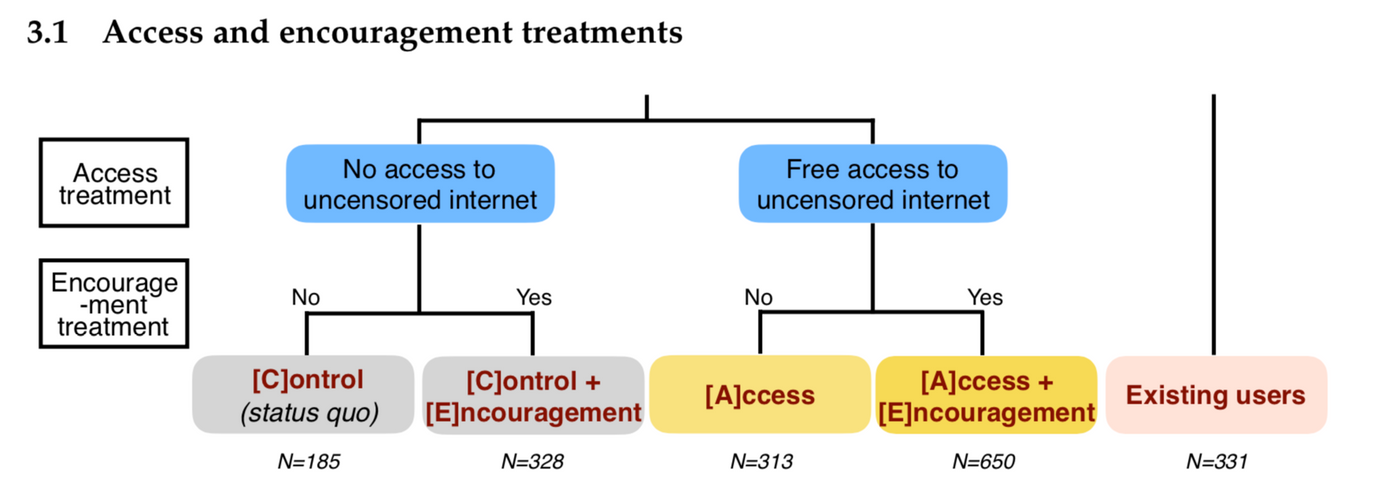媒體審查真的有助於威權統治嗎 | 一場發生在北平的社會實驗
網路上常常有不少身分不明且熱衷於幫助中共辯護的人並不認為中國所建立的防火牆有一定的洗腦作用,甚至不認為中共對中國人從小到大,從學校到社會的政治宣傳有多麼明顯的作用。與之相反的是,他們普遍認為跨越防火牆自由地訪問被封鎖的資訊並不會影響他們對黨忠貞不二的熱愛,甚至有可能因為看到很多西方,港台媒體無恥地「造謠抹黑」反而會愈發加深對黨的熱愛。他們希望藉此證明中國人民支持中共並不是因為被中共利用了,也不是被單一的訊息洗腦了,而是獨立思考所作出的選擇,並希望進一步證明中共做得確實很好,十分得到中國人民發自內心的熱愛。
此類的論調在網路上經久不衰,反而有愈發流行之勢。假設論調為真,一個悖論就會自然而然地產生 – 即既然網路管制,訊息審查並不影響中國人民對中共的擁護,甚至有利於加重其對中共的喜愛之意,那麼中共為什麼還要耗費巨大的社會資源,持續加強訊息審查?難道真的是肉食者鄙,中南海高層的智力還不如這些身分不明的深紅網路鍵盤手?固然,我們不排除肉食者長期居住在深宮禁地,已經長期脫離民意的可能,不過從現實層面考慮此類可能性不大。那麼祇有一種可能,即如近百來年的研究一樣,訊息審查無疑是能夠鞏固極權統治的,故此中共才如此不惜血本。畢竟早在1935年,Guy Stanton在“Dictatorship in the Modern World”一書就已經闡明審查是獨裁政權獲取民意支持和保持政權穩定的關鍵因素。而於中國北京大學任教的Yuyu Chen 教授和於美國哈佛大學David Yang教授於2015到2017年在北平做的一場長達十八月的研究似乎也能證明這一點。
兩位教授設定了兩個research question,即“Does providing access to an uncensored Internet lead citizens to acquire politically sensitive information? Does the acquisition of politically sensitive information change citizens’ beliefs, attitudes, and behaviors? 即中國人如果能與全世界多數國家公民一樣自由地訪問互聯網,他們會樂於去瞭解那些目前被中共禁止傳閱地政治敏感訊息嗎?瞭解更多被禁的政治敏感訊息會改變他們的信仰,態度以及行為嗎?為此, 他們隨機抽取了1800名來自兩所中國大學的學生,並給他們發放限期18個月,穩定,方便,易用的VPN軟體以幫助他們跨過中共的互聯網審查,自由地訪問資訊。同時更好地降低誤差,兩位教授排除掉已經有過反牆經歷的學生而祇是把他們當作baseline,並通過是否給他們免費的VPN服務,是否使用鼓勵和獎勵的方式如前期給參與實驗的學生推送紐約時報中文版的新聞簡要,組織有獎禁答給參與實驗的人分組,以觀察各組實驗結果的差別。

為了測試多種可能性,兩位教授還耍了一招花槍,他們給86%同時發放類似中國版Netflix的流媒體youku會員帳戶以及VPN帳戶,並讓他們自由選擇激活。最後果然導致接近一半(45%)的實驗參與者根本沒去激活VPN帳戶。同時,可能是由於習慣原因,有27%的學生即使激活了VPN帳戶也幾乎不怎麼使用。
Only 55% of the students who receive the free access to uncensored Internet actually activate the tool, despite repeated reminders (Appendix Figure A.4 shows the cumulative activation rate during the first 6 months of the experiment). The low activation rate is unlikely to be an artifact of the treatment distribution modes, because 86% of the students who randomly receive the free Youku VIP (similar to Netflix) account via email and WeChat messages at the same time choose to activate that account within a week. Further- more, 27% of students who activate the tool are not actively using the tool (defined as a student using the tool on more than 40 days after the encouragement treatment ends; robust to alternative definitions; see Table 2, Panel A, column 1). This is very likely the result of deliberately choosing to uninstall the tool.
更有趣的是,由於分組的影響,A組(有免費的VPN帳戶,但不會被任何方式鼓勵訪問敏感資訊,不會收到敏感新聞的簡報)的同學即使擁有VPN帳戶,也幾乎從不訪問國外的新聞媒體。而與之對比的A+E組(有免費的VPN帳戶,同時被鼓勵訪問敏感資訊,前期會定期收到敏感新聞的簡報)相對A組有非常明顯的不同,他們更願意去激活VPN帳戶,也更願意去瀏覽國外的新聞媒體。
These Group-A students spend virtually no time on browsing foreign news websites throughout the experiment。Students in Group-AE are 14 percentage points (25%) more likely to activate the censorship circumvention tool, compared to those who are only given the access treatment。More importantly, the financial incentives to visit the Chinese edition of the New York Times increases the time students spend on this outlet during the encouragement period. Small monetary incentives during the 2nd phase of the encouragement treatment increases these students’ time spent on the New York Times to 5.6 minutes/week during that period.
即使在鼓勵階段結束後,A+E組的同學仍然繼續訪問外國媒體,並且已經開始自行尋找不同的資訊來源。兩組對比可知,中國人長期處於單一的資訊環境中並且習慣了這種環境,他們面對突如其來的陌生世界是無知的。此時如果缺少一個領路人,慣性可能會使他們安於現狀,不做進一步的改變,這也符合人性。但一旦有人領路,協助他們打開新世界的大門,就可以幫他們快速適應這個嶄新的環境,甚至進一步激發他們的求知欲。並且到了實驗結束,A+E組的同學相比其他組的人來講更願意去自費購買VPN服務,因為他們已經有了想知道得更多的慾望。
Moreover, the encouragement treatment leads students to seek out information from blocked websites beyond the one we encourage them to visit. In particular, Group-AE students begin to spend more time on Wikipedia. While students in A and AE groups spend similar amounts of time on Facebook, Twitter, and YouTube, it is likely that Group-AE students begin to consume different types of information on these platforms.
Group-AE students’ increased demand is also captured by their decisions to purchase uncensored In- ternet access. At the endline survey, we provide all study participants with an opportunity to purchase or renew their subscription to access uncensored Internet. Approximately 23% of the Group-AE students renew their access, and they pay on average US$ 21.50 up front for a seasonal subscription (darker bars in Figure 3).21 If we count the students who intend to purchase censorship circumvention tools other than the one we provide (lighter bars in Figure 3), then 52% of the Group-AE students are likely to continue having access to uncensored Internet after the experiment, in contrast to their lack of interest 18 months earlier.
A+E組的獨特性自然就成為了之後觀察指標的重中之重,也成為了解答作者之前提出的研究問題的關鍵之所在。事實證明,因為可以訪問不受限制的新聞媒體,該組的學生在信仰,態度和行為上都出現了較大的改變。比如相對其他對照組來說,他們更加願意去瞭解社會運動,對中國經濟的發展更加悲觀,甚至有一些人撤回了在中國股市的投資,同時也加深了很多對中共的不滿和不信任程度,且他們更希望生活在一個民主自由沒有審查的國家,移民的意願也更強烈。
As newly exposed students realize that sensitive contemporary events remain unreported on domestic news outlets, they may suspect that censored events exist throughout history. Indeed, Group-AE students become 42.4% more likely to have heard of protest events in Greater China during the past decade (e.g. the Hong Kong Umbrella Movement in 2014), and 13.7% more likely to have heard of foreign protests and independence movements (e.g. the Arab Spring in 2011), all of which are highly politically sensitive and tightly censored (Category B.3).
when we ask students to evaluate the government’s performance in the realm of economics (and politics) during the past year (on a scale of 0-10, where 10 indicates full satisfaction), newly exposed stu- dents in Group-AE report a rating 1.254 (and 1.308) lower than that of the students in the C and A groups. Moreover, the newly exposed students report lower trust towards China’s central government by 1.58 (on a scale of 0-10, where 10 indicates complete trust), representing a decrease in political trust of 21.3%, com- pared to that of the unexposed students.
4% of students who were invested in the Chinese stock market, that they have pulled investments out. Group-AE students are 13.5 percentage points more likely to plan on applying to overseas graduate schools and hence leaving China in the near future, a substantial increase compared to the 21.1% of students in C and A groups who report having such plans (Category E.4). Exposure to uncensored information also makes students more likely to prefer foreign cities for future work and residence, although they do not change the sectoral preferences of their careers
最後作者也探討了放開網路管制的影響可能會比實驗中要大。因為實驗中人都是來自中國頂尖大學,受過高等教育,大部分是當之無愧的未來之星,同時作者發現來自相對貧困家庭的人接觸到不受審查訊息的衝擊要比來自富裕家庭的人大得多。因此,放開網路管制幾乎一定會導致社會大眾對此類訊息的需求增加,而因為可以自由地接觸到不同的訊息,自然就會導致他們原本想法的轉變。
作者也同時探討了在長期的單一訊息和網路審查的環境中,也有相當多的人已經習慣了當下處處審查的環境,並堅信西方媒體的報導是沒有價值的。因此這部分人對政治敏感類訊息的需求非常低,即使提供了他們一個窗口,他們可能如A組的同學一樣根本不會去瀏覽政治性的訊息,一些提供免費翻牆軟體的計畫未必會如他們所預期的那樣達到他們的目的。
雖然如此,作者仍然不認為移除長城防火牆讓中國接入自由網路世界是一個穩妥的方式,因為外國媒體的競爭力仍然很強,一旦開了缺口,後果難以預料。畢竟,作者的研究還是發現,uncensored information persistently and substantially changes students’ knowl- edge, economic beliefs, and political attitudes. 不受審查的資訊會持續地改變人的認知和看法。
由中美兩位頂級大學的教授的研究可以看出,親共人士所謂的「越翻牆越愛黨,沒人會相信中共的政治宣傳,中共得到支持是因為他們做得好」以此來否定嚴格的審查會一定程度洗腦中國人民並進一步穩固中共的執政根基這一經過多番驗證的事實是非常可笑的。中共所謂的經濟發展換取執政合法性本身也是一種政治宣傳,因為沒人能證明沒有中共就會經濟崩潰。一個號稱信奉唯物主義,馬克思主義的政黨卻把自己打扮成救世主,喊出沒有共產黨就沒有新中國,沒有共產黨中國救要完了,卻又同時喊歷史是人民群眾創造的的政治宣講口號也是一種莫名的諷刺。所以,一切歸根到底,中共的執政合法性還是來源於洗腦宣傳,尤其是一神教的思想禁錮。